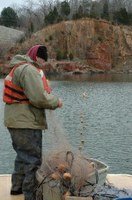Georgia Cooperative Research Unit
 The Georgia Unit conducts research on a variety of topics including broad areas of life history, population dynamics, ecology, and management of important game and non-game fish and wildlife through the region. Recent research has been in partnership with a variety of agencies including the GA Department of Natural Resources, GA Power Company, National Fish and Wildlife Foundation, Nemours Wildlife Foundation, U.S. Army Corps of Engineers, U.S. Fish and Wildlife Service, and the U.S. Geological Survey.
The Georgia Unit conducts research on a variety of topics including broad areas of life history, population dynamics, ecology, and management of important game and non-game fish and wildlife through the region. Recent research has been in partnership with a variety of agencies including the GA Department of Natural Resources, GA Power Company, National Fish and Wildlife Foundation, Nemours Wildlife Foundation, U.S. Army Corps of Engineers, U.S. Fish and Wildlife Service, and the U.S. Geological Survey.
Active Projects:
Time-series Analysis for Monitoring Indicator Species
This research project will involve analysis of priority data as identified by the U.S. Fish and Wildlife Servoce. An overarching research goal for this project is to advance time-series analysis for monitoring of important indicator species.
Responses of Targeted Herpetological Communities to Fire Management Practices in Pine-Oak Forests of the Great Smoky Mountains National Park
This project will investigate relationships between prescribed fire management and herptile community response in this area of the park. The investigation will rely on field sampling and predictive modeling approaches. The outcome of this study, along with a companion project on bird community associations with fire management, will help inform park managers about responses by forest fauna to the reintroduction of fire.
Multi-resolution Assessment of potential Climate Change Effects on Aquatic and Hydrologic Dynamics Part I: Estimating Ecological Change
The objective of this research is to develop tools that aquatic resource managers can use to predict the effects of climate-change and management actions on water availability and aquatic communities at local landscape-scales. We will model effects on aquatic biota at fine resolutions (i.e., stream networks), providing estimates of biological responses for alternative climate scenarios and potential management actions.
Find more Active and Completed Projects here.
Left























